|
|
|
Sort Order |
|
|
|
Items / Page
|
|
|
|
|
|
|
| Srl | Item |
| 1 |
ID:
087932
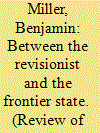

|
|
|
|
|
| Publication |
2009.
|
| Summary/Abstract |
This article explains variations in state war-propensity. I introduce a new typology of state war-proneness based on four major types of states: revisionist, failed, frontier, and status quo. The major novel contribution of this essay is the argument that the combined effect of variations in the extent of success in state-building (strong or weak states) and nation-building (nationally congruent or incongruent) shapes the level and the type of state violence by producing different categories of states with regard to their war-propensity. Strong states but nationally incongruent generate revisionist states, which initiate aggressive wars. The combination of state strength and national congruence leads to a status quo state. Weakness and incongruence bring about civil wars and foreign intervention in 'failed' states. Weakness but congruence produce the 'frontier state' with boundary and territorial wars, but also with a reasonable likelihood of evolution of status quo orientation over time. I focus here on key examples of these types of states, especially from two regions: Iraq and Lebanon in a highly war-prone region - the post-World War II Middle East; and Argentina and Brazil in a more peaceful one, at least in the 20th century - South America, although these states experienced quite a number of wars in the 19th century.
|
|
|
|
|
|
|
|
|
|
|
|
|
|
|
|
| 2 |
ID:
105951
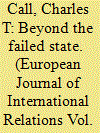

|
|
|
|
|
| Publication |
2011.
|
| Summary/Abstract |
The article advances conceptual alternatives to the 'failed state.' It provides reasons why the concept is deficient, showing especially how counterproductive it is to aggregate states as diverse as Colombia, Malawi, Somalia, Iraq, Haiti, and Tajikistan. I argue for distinguishing among capacity gaps, security gaps, and legitimacy gaps that states experience. Importantly, I show that these gaps often do not coincide in a given country, and that the logical responses to each of the three gaps diverge in significant ways. I offer brief case examples of the logic of response to the gaps and of the tensions that must be managed among them. The article advances the debate over an important and under-theorized emergent concept in global politics.
|
|
|
|
|
|
|
|
|
|
|
|
|
|
|
|
| 3 |
ID:
118576
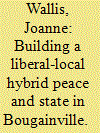

|
|
|
|
|
| Publication |
2012.
|
| Summary/Abstract |
There has been an increasing attempt to theorise the emergence of a liberal-local hybrid approach to state-building, which recognises the coexistence and interaction of liberal and local socio-political institutions. There has not yet been a sustained attempt to understand what occurs when a liberal-local approach is adopted from the outset of a state-building operation. This article seeks to fill this gap by applying the literature to the state-building process in Bougainville, an autonomous region of Papua New Guinea.
|
|
|
|
|
|
|
|
|
|
|
|
|
|
|
|
| 4 |
ID:
089137
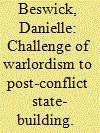

|
|
|
|
|
| Publication |
2009.
|
| Summary/Abstract |
Using evidence from the case of Congo, focusing in particular on the eastern Kivu provinces, this article argues that the enduring presence of warlords, and the influence of their international supporters, remains inadequately addressed by current practices of post-conflict state-building. The dominant contemporary model of state-building currently focuses on the promotion of liberal democracy as a way of avoiding future conflict, highlighting in particular the key role of elections. Simultaneously, it emphasises the importance of security and developing a state monopoly on violence. However, in the pursuit of both these ends in Congo, warlord politics and interference from regional powers continue to pose significant challenges. Exploring key aspects of the rebel movement led by Laurent Nkunda in east Congo (2004-2009), this article will illustrate some of the challenges warlordism poses in Congo, focusing particularly on the shortcomings of a 'single sovereign' approach to state-building. In conclusion, the experience of the Kivus indicates that an approach recognising multiple sovereignties or emphasising significant decentralisation may be more appropriate. Without such a shift in emphasis the notion that Congo is, or will soon become, an empirically functional state is perhaps wishful thinking.
|
|
|
|
|
|
|
|
|
|
|
|
|
|
|
|
| 5 |
ID:
112859
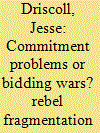

|
|
|
|
|
| Publication |
2012.
|
| Summary/Abstract |
After highly fragmented civil wars, order is often secured through the selective co-optation of rebel field commanders and atomized insurgents. This paper presents a formal model of civil war settlement as a coalition formation game between various regime and rebel factions. This approach emphasizes the ability of installed civilian rulers to lure warlords into the state based on promises of future wealth, then use divide-and-rule tactics to pit different warlord factions against one another. Quantitative and qualitative data from Tajikistan, including an original data set of warlord incorporation and regime purges during wartime reconstruction, are used to evaluate the model.
|
|
|
|
|
|
|
|
|
|
|
|
|
|
|
|
| 6 |
ID:
073298
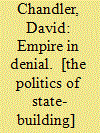

|
|
|
|
|
| Publication |
London, Pluto Press, 2006.
|
| Description |
xii, 221p.
|
| Standard Number |
0745324282
|
|
|
|
|
|
|
|
|
|
|
|
Copies: C:1/I:0,R:0,Q:0
Circulation
| Accession# | | | | | | | | | | | |
| 051576 | 327.11/CHA 051576 | Main | On Shelf | General | | | | | | | |
|
|
|
|
| 7 |
ID:
105238
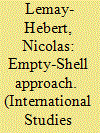

|
|
|
|
|
| Publication |
2011.
|
| Summary/Abstract |
State-building under the aegis of international administrations has faced various hurdles and obstacles in Kosovo and Timor-Leste-failures that came to full light in March 2004 in Kosovo and in May 2006 in Timor-Leste. However, the international conception buttressing the set up of international administrations-I dub it the "empty-shell" approach-is still present in certain policy circles. This article aims to analyze this international conception by clarifying how the UN came to impose its authority over the two territories in a very similar process. While the literature on each state-building experiment is vast and compelling, few authors have attempted to contrast the two case studies, especially regarding the mental conception informing the governance process of these territories since 1999. This article links the empty-shell approach with the delegitimization process that came to be experienced by the UN in both cases. The article describes the international policies put in place by the UN to expand its control over the two territories, a mix of co-option of local elites and the marginalization of the local population. Finally, the article reveals some possible solutions in order to avoid the more blatant difficulties pertaining to state-building conducted from the outside-in.
|
|
|
|
|
|
|
|
|
|
|
|
|
|
|
|
| 8 |
ID:
112773
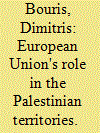

|
|
|
|
|
| Publication |
2012.
|
| Summary/Abstract |
The aim of this article is to shed light on the distinctive role of the EU in Security Sector Reform (SSR) in the case of the Occupied Palestinian Territories (OPTs) and examine how SSR has contributed to the overall state-building project. Following the Oslo Accords, the EU engaged actively in the state-building project in the OPTs taking a number of initiatives on the ground. Since then security has been a key issue in all Israeli-Palestinian agreements and has also became synonymous with Palestinian statehood. The article draws upon literature on state-building and SSR and its central aim is to examine the distinctive initiatives that the EU has taken in order to help the Palestinian Authority (PA) reform both its security and judiciary sector as part of its broader state-building strategy towards the OPTs, as well as provide explanations on why these policies had limited impact.
|
|
|
|
|
|
|
|
|
|
|
|
|
|
|
|
| 9 |
ID:
088419
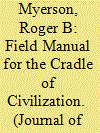

|
|
|
|
|
| Publication |
2009.
|
| Summary/Abstract |
The U.S. Army's Counterinsurgency Field Manual, Bremer's My Year in Iraq, and Xenophon's Education of Cyrus all consider problems of establishing a state. Bremer sees constitutions as fundamental, and the Field Manual emphasizes local security operations and effective governance to establish legitimacy. But Xenophon shows how states are founded by leaders with reputations for reliably rewarding supporters. Agency incentive problems in government make patronage an essential aspect of state-building, and political leaders become fundamentally constrained by their reputations. Democratic competition requires many leaders to develop independent reputations for exercising power and patronage responsibly, which can be encouraged by political decentralization.
|
|
|
|
|
|
|
|
|
|
|
|
|
|
|
|
| 10 |
ID:
109957
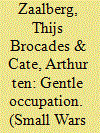

|
|
|
|
|
| Publication |
2012.
|
| Summary/Abstract |
This article examines the so-called 'Dutch approach' to conducting stabilisation operations. The term is mostly used in relation to the mission carried out by the Netherlands armed forces in Afghanistan's Uruzgan province from 2006 to 2010, but actually originates in the Iraqi province of Al Muthanna. Here, a 1350-strong battle group operated from July 2003 until March 2005 as part of the US-led coalition, after which the Dutch forces left Iraq relatively unscathed and self-confident of their ability in dealing with this type of conflict. On the basis of archival research and interviews, the authors unravel the 'Dutch approach' in southern Iraq by tracing its roots and by examining the Dutch operation in the context of the American and British experiences. They argue that despite predominantly effective tactical reflexes and an overall adequately broad interpretation by battle group commanders of a too narrowly defined political mandate, stability in Al Muthanna was conditions-driven rather than the result of a unique and effective approach. The term 'Dutch approach' turned out to be a convenient fabrication which, after the relatively successful mission in Al Muthanna, became increasingly politicised in the run-up to a dangerous new operation in southern Afghanistan.
|
|
|
|
|
|
|
|
|
|
|
|
|
|
|
|
| 11 |
ID:
124155
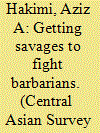

|
|
|
|
|
| Publication |
2013.
|
| Summary/Abstract |
This article focuses on the emergence and evolution of the Afghan Local Police (ALP), a pro-government militia supported by the US military in Wardak Province. The ALP and its previous incarnations have been justified, invoking notions of 'local solutions' and 'cost-effectiveness', as a politically convenient and culturally appropriate measure to supplement broader efforts to counter the insurgency and build up the regular forces. Inspired by the tribal policing concept of arbaki, ALP was envisaged as a short-term local defence force. But the programme has been controversial, and its impact in improving security questionable. In analysing the contestations between different actors involved in the programme, the article demonstrates that the US military's attempt to resuscitate 'age-old traditions' of self-protection proved difficult to realize and produced unforeseen and largely deleterious outcomes. It concludes that far from reflecting the needs of local villagers, ALP was a top-down imposition whose objectives were much narrower than the purported aim of protecting the local population in Wardak.
|
|
|
|
|
|
|
|
|
|
|
|
|
|
|
|
| 12 |
ID:
178527
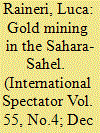

|
|
|
|
|
| Summary/Abstract |
In the Sahara-Sahel, artisanal gold mining is booming. Fragile Sahelian states arguably provide a most likely case for the ‘resource conflict’ theory to hold, yet ‘resource capture’ can also underpin informal governance schemes through which the co-optation of non-state actors ushers in (hybrid) state-building. While the diversity of empirical cases lends credibility to both theories, the dialectic of proximity and distance – both social and spatial – helps make sense of the different modalities of artisanal gold mining governance in the region. In the Sahelian core of regional states, artisanal gold mining has supported regime empowerment; in the Sahara, it has helped assuage pre-existing tensions; in the Tibesti, it has led to militarisation and conflict.
|
|
|
|
|
|
|
|
|
|
|
|
|
|
|
|
| 13 |
ID:
192972
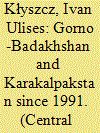

|
|
|
|
|
| Summary/Abstract |
The two Central Asian autonomies of Gorno-Badakhshan and Karakalpakstan have functionally the same competencies as other regions in their respective countries. And yet their autonomous status has persisted. Why? What functions does territorial autonomy carry out in authoritarian states? This paper argues – on the basis of Akchurina’s work of 2019 – that territorial autonomy in Central Asia is a feature of the incomplete state. Namely, territorial autonomy is an institution that sustains informal processes through which state authority is exerted in these challenging territories. The article substantiates this argument by tracing the evolution of centre–region relations in Gorno-Badakhshan and Karakalpakstan since 1991. For Dushanbe, territorial autonomy is a way to symbolically outsource its authority to rebellious local elites, while in Karakalpakstan autonomy allows Tashkent to manage the latent independence claims of the Karakalpaks.
|
|
|
|
|
|
|
|
|
|
|
|
|
|
|
|
| 14 |
ID:
092133
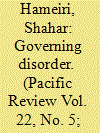

|
|
|
|
|
| Publication |
2009.
|
| Summary/Abstract |
The Australian Federal Police has in recent years become an important actor in both the implementation and design of Australian-led state building interventions in Australia's near region of Southeast Asia and the South Pacific. The article focuses on the recent expansion of the Australian Federal Police as a way of understanding the emergence of a new partly (and strategically) deterritorialized, 'regional' frontier of the Australian state. Within this new frontier, whose fluctuating outlines the Australian Federal Police not only polices but also to a considerable extent shapes and reshapes, as one of the primary expert agencies on identifying and managing transnational security risks, Australian security is portrayed as contingent on the quality of the domestic governance of neighbouring states, thereby creating linkages between the hitherto domestic governing apparatus of the Australian state and those of other countries. This allows for the rearticulation of the problems affecting intervened states and societies - indeed, their very social and political structures - in the depoliticized terms of the breakdown of 'law and order' and the absence of 'good governance', which not only rationalizes emergency interventions to stabilize volatile situations, but also delegitimizes and potentially criminalizes oppositional politics. The Australian Federal Police, however, does more than merely provide justification for intrusive state transformation projects. Its transnational policing activities open up a field of governance within the apparatus of intervened states that exists in separation from international and domestic law. The constitution of such interventions 'within' the state leaves intact the legal distinction between the domestic and international spheres and therefore circumvents the difficult issue of sovereignty. As a result, police and other executive-administrative actors obtain discretionary ordering powers, without dislodging the sovereign governments of intervened countries.
|
|
|
|
|
|
|
|
|
|
|
|
|
|
|
|
| 15 |
ID:
124153
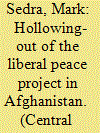

|
|
|
|
|
| Publication |
2013.
|
| Summary/Abstract |
Security sector reform (SSR) has been described as a linch-pin of the liberal state-building and peace-building processes in Afghanistan. The process was originally framed in accordance with the core liberal principles of the SSR model, prioritizing good governance, respect for human rights, sustainability, and democratic civilian control. However, as time passed and security and political conditions began to deteriorate on the ground, the process would gradually revert to a more conventional train-and-equip form, with its core liberal principles stripped away. The slide toward expediency experienced by the SSR process in Afghanistan demonstrates the deeply flawed manner in which the liberal peace project was advanced in Afghanistan. SSR donors became increasingly ambivalent about the human-security objectives of SSR, which were superseded by exigencies of the counterinsurgency, regional security, and domestic pressure for withdrawal. The Afghan experience has raised further doubt about the viability of the orthodox SSR model in conflict-affected countries, already the subject of significant critical debate.
|
|
|
|
|
|
|
|
|
|
|
|
|
|
|
|
| 16 |
ID:
171527
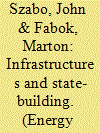

|
|
|
|
|
| Summary/Abstract |
Energy is the lifeblood of a state's economy, which leads energy infrastructures to form intricate relations with state-building. We assess how state-building and energy infrastructures are intertwined and shape one-another. To explore this nexus, we have developed a novel framework that traces the ideology, the political economy, and the technopolitics in this relation. Through case studies focusing on the actions of the European Commission alongside those of the self-proclaimed illiberal governments of Hungary and Poland, we convey the variegated approaches embodied in the state-building – energy infrastructure relation. The Commission has sought to further an integrationist agenda predicated on its bid to create a single EU energy market. This stands in contrast to the paternalism embodied in the approach of the Hungarian and Polish governments to energy infrastructures. These emphasise nationalisation, state-control of key energy sector actors and infrastructures, as well as control over consumer prices. Hungary has also sought to position itself as a regional energy hub, while Poland has looked to maintain energy self-sufficiency, while struggling to meet EU climate goals. We find that the approaches of self-proclaimed illiberal EU countries frequently clash with the Commission's visions. However, in many cases they are reconcilable, although on fundamentally different ideological, political economic, and technopolitical grounds.
|
|
|
|
|
|
|
|
|
|
|
|
|
|
|
|
| 17 |
ID:
108659
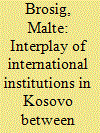

|
|
|
|
|
| Publication |
2011.
|
| Summary/Abstract |
This article examines the interplay of international institutions in Kosovo and aims at disentangling and explaining the emergence and persistence of this international 'interim' regime. In 1999, the UN mission to Kosovo (UNMIK) and the Organisation for Security and Cooperation in Europe (OSCE) were the leading institutions in the civilian area following NATO's deployment of Kosovo Force (KFOR). Following the failed status talks on Kosovo, the EU's rule of law mission (EULEX) and the establishment of an International Civilian Office (ICO) have been set up in addition for increasing institutional complexity. The article analyses how institutional complexity is emerging and what strategies international institutions are applying when confronted with policy overlap. The paper finds that the emergence of institutional complexity in Kosovo is largely a result of historical lock-in effects. International institutions have developed two dominant strategies to cope with dense institutional spaces. First, they show signs of a functional convergence and a coordinated pooling of resources. Second, institutions have developed niche competences to avoid competition.
|
|
|
|
|
|
|
|
|
|
|
|
|
|
|
|
| 18 |
ID:
178460
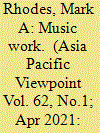

|
|
|
|
|
| Summary/Abstract |
Recent scholarship has opened questions as to the everyday actions of the Khmer Rouge and those living under the regime which led to the Cambodian Genocide. Current work examines the critical cultural geographies of the Khmer Rouge: photography, poetry and music, for example. Music specifically has an interesting underpinning, as it was previously understood to be have been eradicated in the genocide as the standard narrative has us believe. This paper instead investigates the pieces of evidence that exist, which explain the use of music by the Khmer Rouge. I explore the geographies of music beyond the lyrics and look at the transformation and use of music in Cambodia and Democratic Kampuchea. What elements of traditional Khmer music were used during the regime? What modifications occurred to the music of Cambodia during the regime, and how did the Khmer Rouge modify existing Cambodian (and other) music to best fit their desired uses (state-building and genocide)? This paper goes beyond traditional geographies of music, which rely on lyrical analyses, to bring an ethnomusicological perspective to the work of music and its role in shaping the idea of the Democratic Republic of Kampuchea.
|
|
|
|
|
|
|
|
|
|
|
|
|
|
|
|
| 19 |
ID:
123455
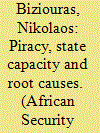

|
|
|
|
|
| Publication |
2013.
|
| Summary/Abstract |
By comparing the Somali experience of piracy with the emerging situation in the Gulf of Guinea, I show that increases in the enforcement aspects of state capacity in the Gulf of Guinea states are necessary but not sufficient tools to combat the emergence, growth, and institutionalisation of piracy. Such tools would require state-building measures that would minimise the incentives of individuals to join piracy organisations and they would have to effectively deal with youth unemployment, income inequality, and environmental degradation.
|
|
|
|
|
|
|
|
|
|
|
|
|
|
|
|
| 20 |
ID:
115263
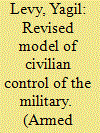

|
|
|
|
|
| Publication |
2012.
|
| Summary/Abstract |
What determines the subordination of the military to civilian control? Existing scholarship has neglected the power structure within which relations between the military and civilians are embedded. Addressing this oversight, this article theorizes that civilian control of the military is influenced by two relations of exchange: (1) the republican exchange, wherein the state provides its citizens with rights in exchange for their military sacrifice; and (2) the control exchange, in which the military subordinates itself to civilian rulers in exchange for resources the state provides. If both relations of exchange are in equilibrium, civilian institutions can establish firm supremacy over the military. This article examines the causes and consequences of disequilibrium. It concludes that disequilibrium in the republican exchange can undermine the control exchange and civilian supremacy over the military. Applications and implications of the theory are developed through examples from the United States and Israel.
|
|
|
|
|
|
|
|
|
|
|
|
|
|
|
|
|
|
|
|
|